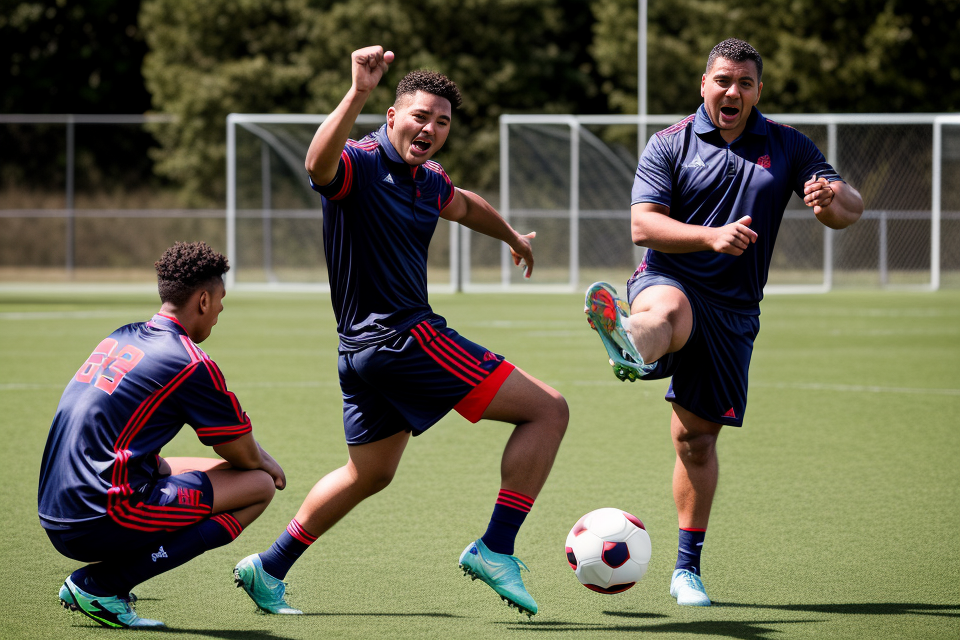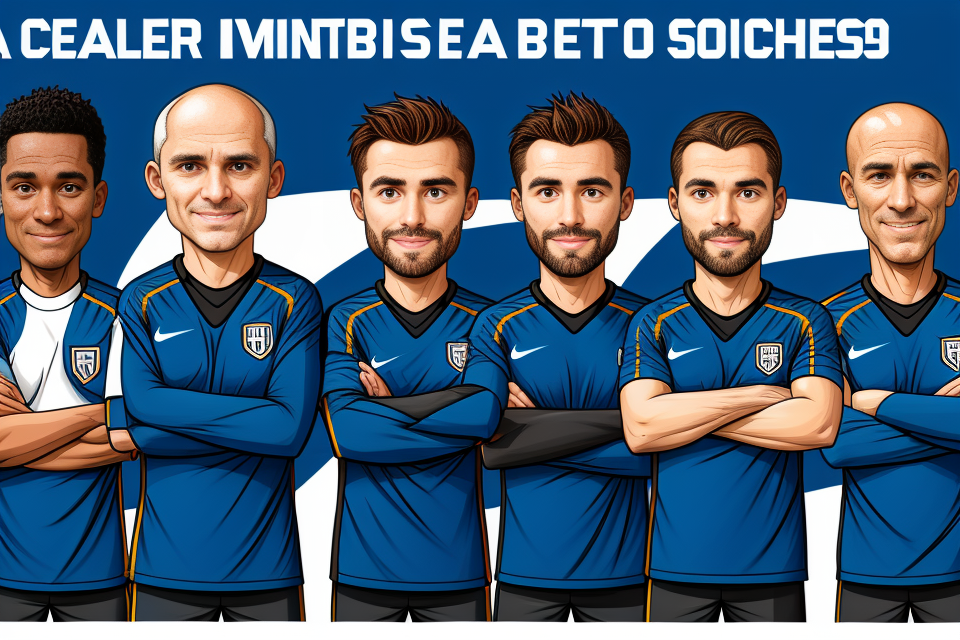Professional sports teams invest a significant amount of time, effort, and resources to assemble the best roster of players. However, even with the most talented players, these teams need guidance and direction to achieve success. This is where coaches come in. In this article, we will explore the importance of coaches in professional sports, with a particular focus on soccer. We will examine how coaches provide leadership, strategic planning, and tactical knowledge to help their teams succeed on the field. So, whether you’re a die-hard soccer fan or just curious about the inner workings of professional sports, read on to discover why coaches are essential to the success of pro teams.
The Role of Coaches in Professional Soccer
The Technical Aspects of Coaching
The technical aspects of coaching in professional soccer are critical to the success of a team. These aspects encompass a range of skills and knowledge that coaches must possess to help their players perform at their best. The following are some of the key technical aspects of coaching in professional soccer:
Tactics and Strategies
Tactics and strategies are essential components of coaching in professional soccer. A coach must have a deep understanding of the game and be able to develop tactics and strategies that will help the team win matches. This involves analyzing the strengths and weaknesses of the opposing team and devising tactics that will exploit those weaknesses while minimizing the impact of the team’s own weaknesses.
Effective tactics and strategies in professional soccer often involve the use of formations, player positioning, and movement. A coach must be able to analyze the strengths and weaknesses of the opposing team and devise tactics that will exploit those weaknesses while minimizing the impact of the team’s own weaknesses.
Player Positioning and Movement
Player positioning and movement are also critical technical aspects of coaching in professional soccer. A coach must be able to instruct players on where to position themselves on the field and how to move effectively to support their teammates and create scoring opportunities. Effective player positioning and movement require a deep understanding of the game and the ability to analyze the actions of both the opposing team and one’s own team.
Team Formations
Team formations are another essential technical aspect of coaching in professional soccer. A coach must be able to select the best formation for the team based on the strengths and weaknesses of the players and the opposition. Different formations have different strengths and weaknesses, and a coach must be able to select the formation that will give the team the best chance of success.
In addition to selecting the best formation, a coach must also be able to instruct players on their roles within the formation. This requires a deep understanding of each player’s strengths and weaknesses and how they can best contribute to the team’s overall performance.
Overall, the technical aspects of coaching in professional soccer are critical to the success of a team. A coach must possess a deep understanding of the game and be able to develop effective tactics, strategies, player positioning, and team formations to help the team win matches.
The Psychological Aspects of Coaching
Motivation and Leadership
Coaches play a crucial role in motivating and leading their players. They are responsible for creating a positive team culture, establishing clear goals and expectations, and providing guidance and support to their players. A coach’s leadership style can have a significant impact on the team’s performance and overall success. Effective leaders are able to inspire and motivate their players, fostering a sense of camaraderie and unity within the team. They are also able to adapt their leadership style to different situations and players, taking into account individual strengths and weaknesses.
Building Team Cohesion
Another important aspect of coaching in professional soccer is building team cohesion. Coaches must create an environment where players feel comfortable working together and are able to support each other both on and off the field. This can involve team-building exercises, fostering open communication, and promoting a sense of shared responsibility. When players feel connected to one another and the team as a whole, they are more likely to work together effectively and achieve success.
Handling Pressure and Criticism
Professional soccer coaches also play a key role in helping their players handle pressure and criticism. The world of professional sports can be highly competitive and stressful, and coaches must be able to help their players perform under pressure. This can involve developing mental toughness, managing stress and anxiety, and helping players stay focused on their goals. Additionally, coaches must be able to handle criticism from fans, media, and other stakeholders, and help their players develop thick skin and a resilient mindset. When players are able to handle pressure and criticism effectively, they are more likely to succeed both on and off the field.
Why Coaches are Essential for Success in Professional Soccer
Improved Performance and Results
- Enhanced Technical Skills: One of the primary responsibilities of a soccer coach is to develop and refine the technical skills of their players. This includes improving ball control, dribbling, passing, shooting, and other fundamental aspects of the game. A skilled coach can help players identify areas where they need improvement and develop effective training programs to enhance their abilities. By working with a knowledgeable coach, players can improve their technical skills and become more confident on the field.
- Better Tactical Understanding: In addition to technical skills, coaches also play a critical role in developing their players’ tactical understanding of the game. This includes strategies for positioning, passing, and defending, as well as the ability to read and react to the movements of opponents. A coach can help players learn how to anticipate and respond to different situations on the field, leading to better decision-making and more effective team play.
- Increased Physical Conditioning: Another key aspect of a coach’s role is to ensure that their players are physically conditioned to meet the demands of the game. This includes developing strength, endurance, and agility, as well as improving overall fitness and stamina. A coach can design training programs that are tailored to the specific needs of their players, helping them to avoid injury and perform at their best during matches. By emphasizing the importance of physical conditioning, coaches can help their players maintain peak performance levels throughout the season.
Developing Future Soccer Stars
Coaches play a vital role in developing future soccer stars by identifying and nurturing talent, providing guidance and support, and creating a pathway to professional soccer.
Identifying and Nurturing Talent
Coaches are responsible for identifying and nurturing talent in young players. They scout for potential players, assess their skills and abilities, and select those who have the potential to become professional soccer players. Once identified, coaches work with these players to develop their skills and improve their performance. They provide personalized training and feedback, helping players to enhance their technical and tactical abilities, physical fitness, and mental toughness.
Providing Guidance and Support
Coaches also provide guidance and support to young players as they progress through the ranks. They offer advice on nutrition, injury prevention, and mental preparation, helping players to make informed decisions and stay focused on their goals. Coaches also help players navigate the challenges of professional soccer, providing guidance on contract negotiations, media relations, and other aspects of the sport.
Creating a Pathway to Professional Soccer
Coaches play a critical role in creating a pathway to professional soccer for young players. They connect players with scouts, agents, and other industry professionals, helping them to secure opportunities to play at higher levels. Coaches also provide support and guidance as players transition from youth to professional soccer, helping them to adapt to the demands of the sport and succeed at the highest level.
Overall, coaches are essential for developing future soccer stars. They identify and nurture talent, provide guidance and support, and create a pathway to professional soccer, helping young players to achieve their dreams and become successful players both on and off the field.
Building a Winning Culture
Coaches play a vital role in building a winning culture within a professional soccer team. A winning culture is a set of values, beliefs, and practices that foster success on and off the field. It is a combination of high standards, positive team environment, and continuous improvement.
Establishing High Standards
One of the primary responsibilities of a coach is to establish high standards for their team. This includes setting clear expectations for player behavior, performance, and work ethic. High standards create a sense of accountability and drive players to perform at their best. They also set the tone for the team’s overall culture and create a clear direction for the team’s goals.
Fostering a Positive Team Environment
A positive team environment is essential for success in professional soccer. A coach must create an atmosphere where players feel supported, valued, and motivated. This can be achieved through positive reinforcement, open communication, and trust-building exercises. A positive team environment fosters a sense of camaraderie and teamwork, which are critical for success on the field.
Encouraging Continuous Improvement
Continuous improvement is a crucial aspect of building a winning culture in professional soccer. A coach must be able to identify areas where players can improve and provide constructive feedback. This can be achieved through regular training sessions, video analysis, and individual coaching sessions. Continuous improvement helps players to develop their skills, increase their confidence, and reach their full potential.
In conclusion, building a winning culture is a critical aspect of success in professional soccer. A coach must establish high standards, foster a positive team environment, and encourage continuous improvement. By doing so, they can create a culture that drives success on and off the field and helps players to reach their full potential.
The Challenges of Coaching in Professional Soccer
Managing Expectations and Pressure
Professional soccer coaches are under immense pressure to deliver results, but they also have to navigate various challenges that come with managing expectations. These challenges can have a significant impact on the team’s performance and the coach’s career. Here are some of the ways coaches manage expectations and pressure in professional soccer:
Navigating Criticism and Scrutiny
Coaches in professional soccer are always under the microscope, and they have to deal with criticism and scrutiny from fans, media, and stakeholders. The pressure to perform well can be overwhelming, and coaches have to learn how to navigate these challenges to avoid getting caught up in negative emotions. Coaches have to be resilient and use criticism as a way to improve their performance and the team’s performance.
Handling Roster Changes and Injuries
Professional soccer teams are constantly changing, and coaches have to deal with roster changes and injuries throughout the season. Coaches have to manage these changes effectively to maintain team cohesion and ensure that the team performs well. They have to be flexible and adaptable to changing circumstances and use their experience to make informed decisions.
Balancing Player Development and Winning
Coaches in professional soccer have to balance player development and winning. While winning is essential, it is also crucial to develop young players and build a strong team for the future. Coaches have to find a balance between winning now and investing in the team’s long-term success. This requires a strategic approach and a long-term vision.
Overall, managing expectations and pressure is a critical aspect of coaching in professional soccer. Coaches have to navigate various challenges, including criticism and scrutiny, roster changes and injuries, and balancing player development and winning. To succeed in this high-pressure environment, coaches need to be resilient, adaptable, and strategic.
Adapting to New Technologies and Analytics
- Utilizing Data to Inform Decisions
One of the most significant challenges for coaches in professional soccer is the need to utilize data to inform their decisions. With the proliferation of advanced analytics in the sport, coaches must now have a deep understanding of statistics and how they can be used to gain a competitive edge. This involves not only analyzing performance metrics such as passing accuracy and shots on target, but also using data to scout opponents and identify weaknesses that can be exploited.
- Implementing Advanced Training Methods
Another challenge for coaches in professional soccer is keeping up with the latest advances in training methods. With new technologies and techniques emerging all the time, coaches must be constantly innovating and adapting their training programs to ensure that their players are always improving. This can involve incorporating new equipment, such as wearable technology, into training sessions, as well as developing novel drills and exercises that challenge players in new ways.
- Keeping Up with the Evolving Landscape of Soccer
Finally, coaches in professional soccer must also contend with the constantly evolving landscape of the sport. With new tactics and formations being developed all the time, coaches must be able to adapt their teams quickly and effectively to counter new threats and exploit new opportunities. This requires a deep understanding of the game, as well as a willingness to take risks and try new things.
FAQs
1. Why do pro teams need coaches?
Professional sports teams need coaches to guide and train their athletes to achieve the best possible performance on the field. Coaches are responsible for developing game strategies, creating training programs, and providing feedback to players to help them improve their skills and reach their full potential. In soccer, coaches play a crucial role in helping players develop their technical abilities, such as dribbling, passing, and shooting, as well as their tactical awareness and teamwork skills.
2. What qualities should a good coach have?
A good coach should have a strong knowledge of the sport, as well as excellent communication, leadership, and organizational skills. They should be able to motivate and inspire their players, communicate clear expectations and goals, and create a positive team culture. A good coach should also be able to adapt to changing circumstances and make difficult decisions when necessary.
3. How does a coach help a soccer team win games?
A coach helps a soccer team win games by developing effective game strategies, identifying and addressing weaknesses in the team’s play, and motivating and inspiring the players to perform at their best. They work with the team to develop tactics and formations that maximize their strengths and minimize their weaknesses, and they provide individualized feedback and coaching to help players improve their skills and performance.
4. How important is the role of a coach in a soccer team?
The role of a coach is crucial in a soccer team. They are responsible for guiding and developing the team’s players, both individually and collectively, and for creating a winning culture that fosters success on and off the field. A good coach can make all the difference in a team’s performance, and the best coaches are often able to transform average players into champions.
5. How do coaches prepare for a game?
Coaches prepare for a game by analyzing the strengths and weaknesses of their opponents, developing game strategies and tactics, and practicing with their own team to ensure that they are ready for the competition. They may also review footage of previous games to identify areas for improvement and make adjustments to their tactics and formations. On game day, coaches are responsible for managing the team’s energy and focus, making key decisions during the game, and adjusting their strategy as needed to ensure success.



